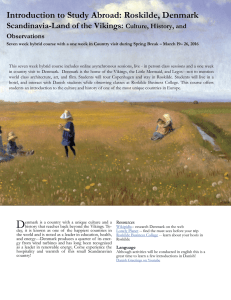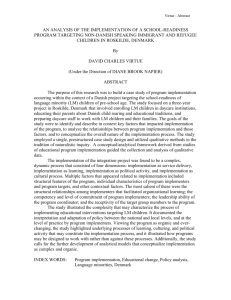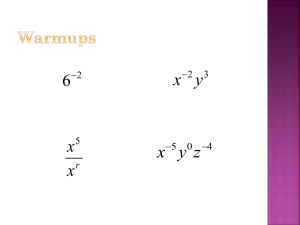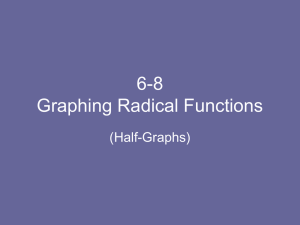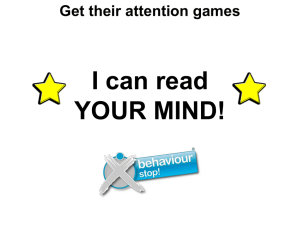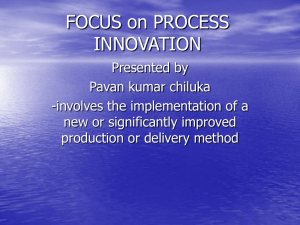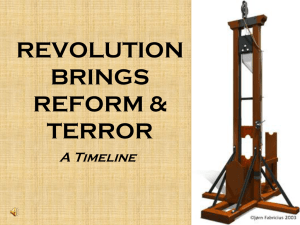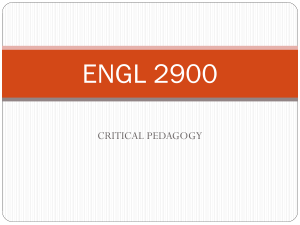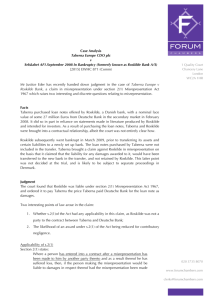Full Schedule Oxford Event - The Freedom to Learn Project
advertisement
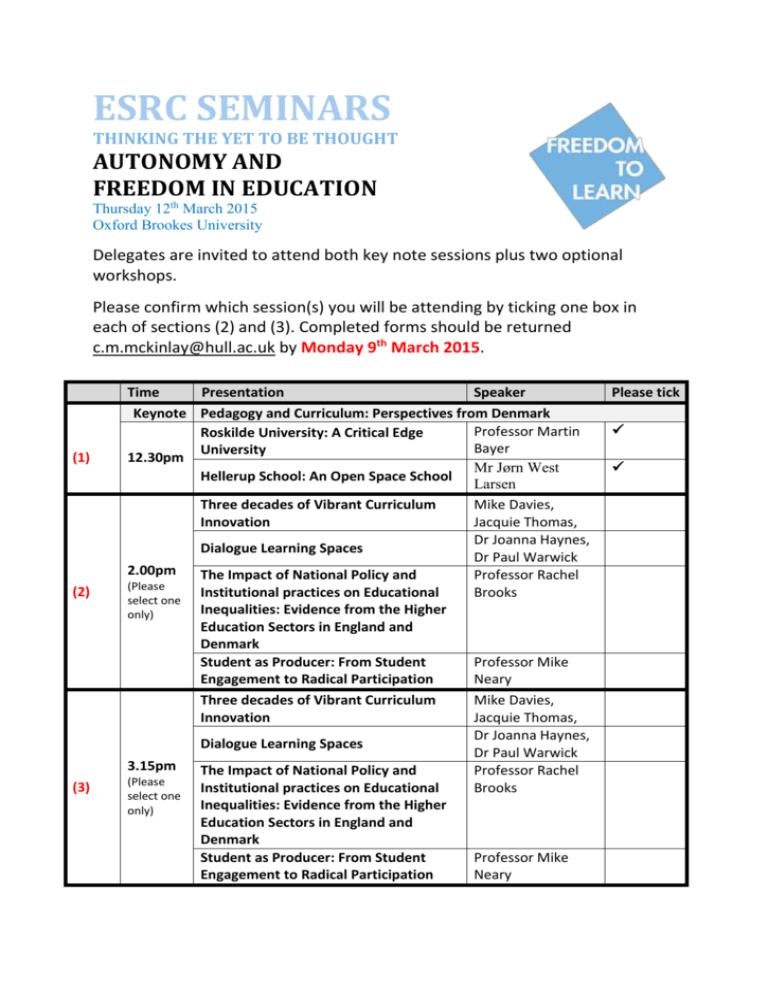
ESRC SEMINARS THINKING THE YET TO BE THOUGHT AUTONOMY AND FREEDOM IN EDUCATION Thursday 12th March 2015 Oxford Brookes University Delegates are invited to attend both key note sessions plus two optional workshops. Please confirm which session(s) you will be attending by ticking one box in each of sections (2) and (3). Completed forms should be returned c.m.mckinlay@hull.ac.uk by Monday 9th March 2015. (1) (2) (3) Time Presentation Speaker Keynote Pedagogy and Curriculum: Perspectives from Denmark Professor Martin Roskilde University: A Critical Edge Bayer University 12.30pm Mr Jørn West Hellerup School: An Open Space School Larsen Three decades of Vibrant Curriculum Mike Davies, Innovation Jacquie Thomas, Dr Joanna Haynes, Dialogue Learning Spaces Dr Paul Warwick 2.00pm The Impact of National Policy and Professor Rachel (Please Institutional practices on Educational Brooks select one Inequalities: Evidence from the Higher only) Education Sectors in England and Denmark Student as Producer: From Student Professor Mike Engagement to Radical Participation Neary Three decades of Vibrant Curriculum Mike Davies, Innovation Jacquie Thomas, Dr Joanna Haynes, Dialogue Learning Spaces Dr Paul Warwick 3.15pm The Impact of National Policy and Professor Rachel (Please Institutional practices on Educational Brooks select one Inequalities: Evidence from the Higher only) Education Sectors in England and Denmark Student as Producer: From Student Professor Mike Engagement to Radical Participation Neary Please tick Keynote session (12.30 – 2.00pm) Pedagogy and Curriculum: Perspectives from Denmark Roskilde University – a critical edge university (All delegates) Prof Martin Bayer, Head of Department, Culture and Identity Since its inception in 1972, Roskilde University, 30km from Copenhagen, has evolved from being a key innovative creation in the higher education system, in many ways ahead of its time, to become a research university that today is recognized as an important educational alternative in the university world. The university has developed over the years and has always been a centre of critical pedagogy and education. The educational philosophy of Roskilde University is based in the core concepts of problem oriented, interdisciplinary and participant-directed project work. This keynote session will outline the core model of Roskilde University and its development over time. It will also highlight key challenges of maintaining this creative way of working, including: conservatism regarding single academics subjects; the emphasis from politicians and business managers on meeting the immediate needs of society and the labour market; and the continual challenges of addressing different needs and requirements of students. Hellerup School – an open-space school (All delegates) Jørn West Larsen, Head Teacher Hellerup School, a new public school in Gentofte Municipality near Copenhagen, was planned and designed in a close cooperation between students, parents and staff. It describes itself as an open-space school, based on a coherent thinking of pedagogy and learning environment. The environment creates space for learners’ autonomy, and the daily learning processes are based on a broad fan of learning strategies, according to the different ways that students learn. This keynote session will discuss pedagogy and curriculum including: visible aims for learning for the individual student and for the group; academic, social and personal skills; using students’ voices and the role of trust. This will be placed against the backdrop of the new Danish School Reform which was introduced in August 2014. Workshops - Delegates should choose two from the four below Three decades of vibrant curriculum innovation … Mike Davis (Human Scale Education) and Jacquie Thomas (Stanley Park High School) This workshop will continue the theme of Denmark by showcasing the extraordinary The National Innovative Centre for General Education (SPF). This radical pedagogic centre, now closed, followed a tradition of small schools working with the rhythm of youth on a democratic model. The curriculum was co-constructed, parents were partners, the community was a resource and network. The school was a place for the community to access resources and engage in intergenerational working. From SPF in 1995 we can move some of the above themes and explore them at Bishops Park College, Clacton-on-Sea, UK in 2005 and finally see them thrive in 2015 in Stanley Park High School, Sutton … where the candle of student centred learning is burning brightly with real hope of sustainable renewal. Dialogic Learning Spaces Dr Joanna Haynes (Plymouth University) and Dr Paul Warwick (Plymouth University) Dialogue is a contested idea and a demanding practice as it requires listening, criticality, collaboration and disagreement. This workshop offers participants the opportunity to explore ways that educators can work with students to create open spaces for dialogue to flourish. Drawing from their practice and research with schools, young people, teachers and university students, Joanna and Paul will share some ideas on working with learners to establish favourable conditions and relations for dialogue. Their work has focused on creating space for students to take part in philosophical enquiry and to learn through critical and imaginative deliberation on contested concepts and controversial issues. Following Joanna and Paul’s brief introductory conversation participants will be invited to join in an enquiry into dialogic pedagogies, drawing on experiences and ideas. The impact of national policy and institutional practices on educational inequalities: evidence from the higher education sectors in England and Denmark Prof Rachel Brooks (University of Surrey) Making links to the keynote address, this presentation-based workshop will explore the extent to which differences by nation-state affect the nature and magnitude of educational inequalities. It will draw on a cross-national comparison of the experiences of higher education students with dependent children in England and Denmark, and consider the impact of, inter alia, differing ‘welfare regimes’, mechanisms for funding higher education, and gender norms on the way in which inequalities are played out. Student as Producer: From Student Engagement to Radical Participation Prof Mike Neary (University of Lincoln) This interactive workshop will involve a critical discussion of the concepts of student engagement and partnerships, as well as discovering more radical approaches to teaching and learning in higher education. These more radical approaches will include Student as Producer, which will be presented to participants as a way of radicalising the higher education curriculum and institutions of higher learning.
